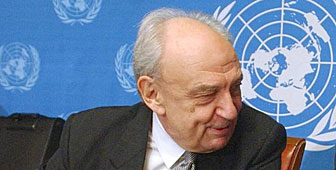Petrovsky says adieu as Swiss head to polls

The outgoing United Nations' director general, Vladimir Petrovsky, says Switzerland would be a valuable asset to the world body.
Speaking to swissinfo ahead of Sunday’s vote on joining the UN, Petrovsky said Switzerland could lead by example as a member.
“Switzerland has developed as a multi-cultural, democratic country, which is based on a certain moral and ethical values. This is exactly the kind of example we need in the United Nations,” Petrovsky said.
“It would be important for us if Switzerland’s voice were heard. It could share its experience. The other countries have a lot to learn from Switzerland.”
Petrovsky said the UN had changed enormously since he took up the reigns as director general nine years ago. At the time, his native country and its former satellite states were in the throes of transition; the Cold War certainties had disappeared and the UN had to find a new role.
Pivotal role
The Russian diplomat – who was effectively Secretary-General Kofi Annan’s representative in Geneva – says those changes are reflected in the increasing pivotal role Geneva plays in international relations.
He describes the Swiss city as the world capital of “human security” – a title, he says, that encompasses far more than the prevention of conflicts. In Petrovsky’s view, Geneva will retain this role even if the Swiss reject UN membership.
“The security of human beings is not only a question of being safe from violence, but also from hunger, disease and environmental degradation,” he says. “In that, Geneva plays a pivotal role.”
Petrovsky identified five key areas in which the UN and Geneva play a crucial role: humanitarian affairs and human rights, trade and development, science and technology, research and training, and disarmament.
There are obvious overlaps between these fields, but the presence in Geneva of so many specialised UN agencies means they can be tackled effectively.
“These synergies are important. Our activities have to be complementary. In a globalised world, you can’t separate them,” Petrovsky says. “Disarmament is not just about disarmament. It has implications for development and the protection of human rights.”
Driving licence
In 2001, Geneva hosted no fewer than 9,000 meetings and conferences – twice as many as the UN in New York. But while this traditional conference diplomacy and treaty negotiating continues – drawing up what Petrovsky calls the international drivers’ licence for governments – another important area of activity has emerged.
Petrovsky says that increasingly Geneva has become a forum for intellectual exchange, with government delegations coming simply to learn and benefit from the reservoir of experience at the UN.
“It is becoming a focal point for know-how sharing,” he says.
As well as heading the UN in Geneva, Petrovsky has also occupied the post of secretary general of the UN Conference on Disarmament, and was instrumental in the signing of the Comprehensive Test Ban Treaty in 1996.
Retirement does not mean that Petrovsky will be severing his ties with Geneva. He will be dividing his time between the Swiss city and Moscow.
Petrovsky will be replaced in the post of UNOG Director-General by another Russian diplomat, Sergei Ordzhonikidze.
by Roy Probert

In compliance with the JTI standards
More: SWI swissinfo.ch certified by the Journalism Trust Initiative
You can find an overview of ongoing debates with our journalists here. Please join us!
If you want to start a conversation about a topic raised in this article or want to report factual errors, email us at english@swissinfo.ch.